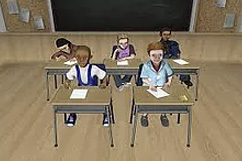
New Program Uses Cutting-Edge Technology to Prepare Teachers to Reach English Learners
Much of teacher education has stayed the same over time. Coursework in learning theory and teaching methodology, as well as classroom observations and internships, have been central features for decades. During this time, however, a lot has changed in PreK-12 schools, including the increasing use of technology and a more diverse student population. Educators throughout the nation agree that teachers need to use these two valuable assets to the advantage of all students’ academic achievement. A key factor in accomplishing this is building teachers’ instructional skills so they can successfully implement them in their classrooms.
Part of the growing diversity in PreK-12 schools are English learners, students for whom English is their second language and who are in the process of developing full proficiency in English. Future teachers who are enrolled in licensure programs need preparation in teaching English learners (also referred to as “ELs”) and in managing classrooms with native English speakers and ELs at different English proficiency levels.
To help future elementary teachers meet this challenge, a new program funded by the U.S. Department of Education’s Office of English Language Acquisition (OELA) entitled Project MELTS (Micro-credentialing of English Learner Teaching Skills), applies the latest, most innovative technologies to prepare teachers to support the academic achievement and English language development of English learners.
Based at the University of Central Florida (UCF), Project MELTS identified ten skills that teachers need for supporting the success of English learners. The MELTS team took each of these skills, for example leading a questioning sequence with a group of students, and applied them to teaching English learners at three English proficiency levels: beginning, intermediate, and advanced.
Each of these ten teaching skills is first modeled for student teachers at UCF, with a master teacher using the skill with elementary-age English learners in online video modules. After viewing each video, student teachers develop a similar activity that uses the skill, and they practice it in individual coaching sessions using a mixed-reality classroom with five simulated students (called TeachLivE), that includes three English learners. An expert coach observes the participants’ activity and interaction with the EL student avatars, and gives these future teachers feedback regarding pacing, tone, gestures, vocabulary level, appropriateness of delivery for proficiency level, and the content of the activity that they are leading. Using the coaching feedback, participants reflect on what they can do better and then go on to complete a skill performance assessment using TeachLivE, which ultimately leads to their earning a digital badge for the skill of focus.
Nine of the ten digital badges focus on a specific area aimed at improving EL’s academic achievement, and the tenth one helps future teachers learn how to conduct a conference with a parent of an EL. Participants have the opportunity to feature their digital badges on an online professional learning platform (Credly) and also on LinkedIn. Principals are becoming aware of the value of the MELTS digital badges and will consider them in hiring decisions.
Preliminary research on the effectiveness of the Project MELTS skill development process has shown that participants believe that the videos realistically depict the skill of focus and that the coaching and assessment sessions provide valuable, individualized guidance in building a repertoire of key skills for teaching English learners. They indicate that the mixed reality element of the coaching and assessment is lifelike and gives them the opportunity to practice interacting with different English proficiency levels in a supportive environment.
Project MELTS is also piloting the online videos, mixed reality classroom, and digital badges with current teachers of all subjects and grades, and held a dynamic three-day workshop with 30 teachers in Pinellas County, Florida in June. The project team is planning to expand options for teacher professional learning in the upcoming year. For more information, please contact the project director, Dr. Joyce Nutta.
Sample MELTS Online Video Clips for Skill 1